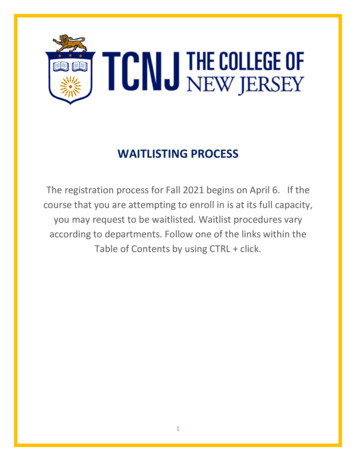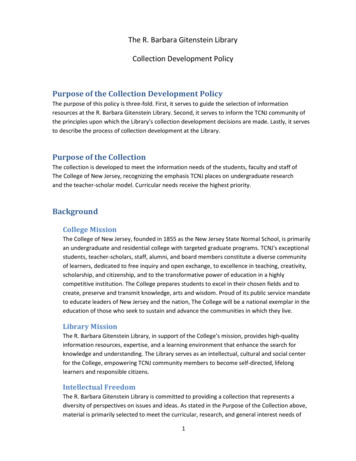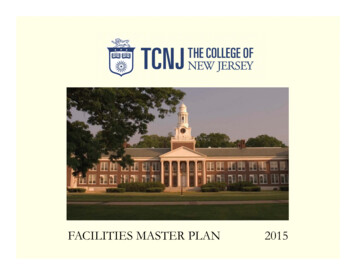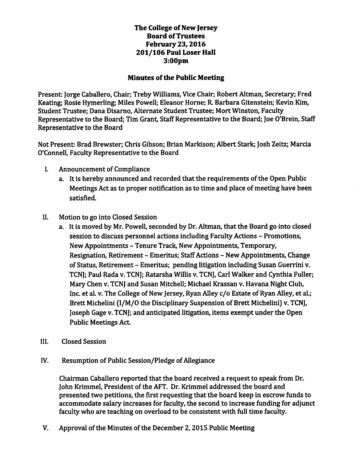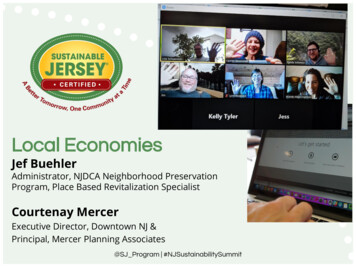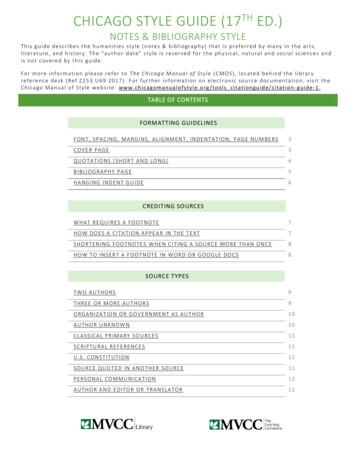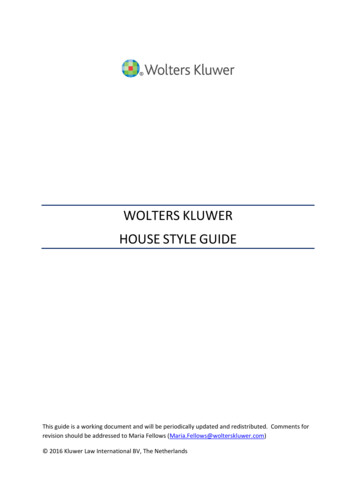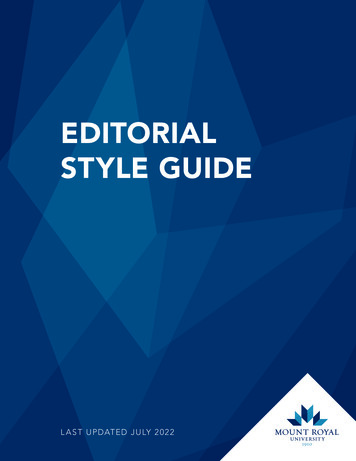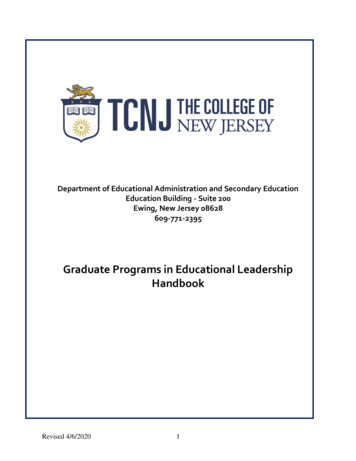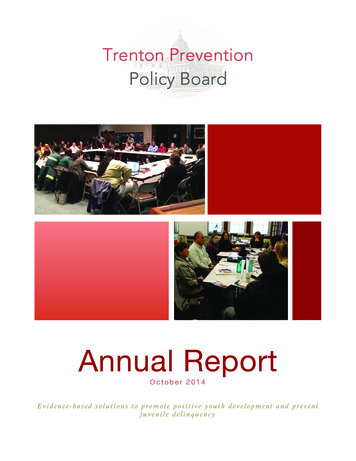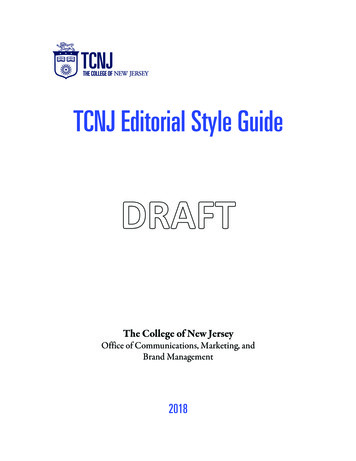
Transcription
TCNJ Editorial Style GuideThe College of New JerseyOffice of Communications, Marketing, andBrand Management2018
IntroductionThis Editorial Style Guide has been developed by the Office of Communications, Marketing,and Brand Management as a quick reference tool to simplify decision making when writing onbehalf of the college, and establish a style that is consistent and appropriate. Styles in this guideapply to both print and electronic materials written for and about the college.The primary purpose of this guide is to address topics specific to The College of New Jersey,focusing on some of the most common issues encountered when writing on behalf of thecollege. It is meant to expand on topics that may not be adequately covered in the standardpublished style guides, such as The Chicago Manual of Style or The Associated Press Stylebook. Inaddition, the guide is a reference for institutional style and nomenclature.If you cannot find what you are looking for, or if you have any additional questions orsuggestions for this guide, please contact Mary Sanders at msanders@tcnj.edu.441
1515161616161617Abbreviations, Initialisms, and AcronymsAcademic DegreesAcademic AmpersandArt GalleryAthletics Hall of FameAthleticsAthletics s DesignationsClass Year ReferencesClubsCollege NomenclatureCommaCommittees, Societies, ClubsCompriseCoursesCourse WorkDashes (en and ems)DatesDegreesDepartments, Divisions, and OfficesDoctoral TitlesEllipsisEmailEmeritus, EmeritiEnsure/Insure/AssureEvents442
nsGovernmentGrade Point Average (GPA)Hall of FameHistorical PeriodsHomepageHonorsHyphenInternetLGBTLions PrideLions StadiumMaiden NamesMoneyNumeralsOff Campus/On CampusOfficesOnlineOrdinalsPart Time/Full TimePercentPerformance HallsPlurals and PossessivesPost-, Pre-, ReProgramsQuotation MarksRankingsResidence HallSchoolsSeasonsSpacing Between SentencesSpacing, En- and Em-DashesStatesTCNJ Board of TrusteesTCNJ FoundationTelephone NumbersTheater/TheatreTime443
2929303030313131313232Titles of PeopleTitles of WorksTowardTrademarksU.S. and U.K.Vita, VitaeWashington, D.C.Web AddressesWebpage, WebsiteWorld Wide WebYears444
ABBREVIATIONS, INITIALISMS, and ACRONYMS[see also ACADEMIC DEGREES, GRADE POINT AVERAGE, TITLES OF PEOPLE, U.S. AND U.K., WASHINGTON, D.C.]1. Avoid abbreviations in running text.Correct: Professor Smith went to the market to study recent economic impactson vegetable sales.Incorrect: Prof. Smith went to the market.2. Abbreviations can be used in running text when they are part of official names.The student center was designed by J. T. Brown & Partners.3. When abbreviating The College of New Jersey, always use the initialism TCNJ. Never useCNJ or CONJ.4. With most initialisms and acronyms, always spell out the full name, title, or phrase the firsttime you refer to it in text. Do not follow it immediately with the initialism/acronym inparentheses.Correct: The National Endowment for the Humanities awarded a summerfellowship to John Jones. The NEH awards.Incorrect: The National Endowment for the Humanities (NEH) has alwaysbeen fond of TCNJ.5. Do not use periods between the letters of initialisms.Correct: TCNJ, SAT6. No apostrophe is needed for the plural form of initialisms/acronyms (SATs, GREs, IKEAs,1960s, 60s).7. An apostrophe is used for the possessive form (TCNJ’s stadium, IKEA’s sales).8. Use periods for two-letter abbreviations. Do not use periods when using postal codes inaddresses.9. Skip periods if used in headlines.444
ACADEMIC DEGREES[see also DOCTORAL TITLES, TITLES OF PEOPLE]1. Do not use periods between the letters of degrees.Correct: BA, BFA, MA, BS, PhD, EdD, EdS, JD, MEd2. In references to degrees, the word degree is never capitalized.Correct: Robin earned her Master of Arts in Teaching degree last spring.3. When referring to degrees in general, lowercase the first letter of the degree.Correct: He earned a bachelor’s degree in engineering.4. Capitalize formal names of academic degrees.Correct: Bachelor of Science, Master of Arts5. Note that while bachelor’s and master’s end in ’s, other generic words for degrees do not.Correct: associate degree, bachelor’s degree, master’s degree, doctoral degree,doctorate6. Be careful to use the correct form of degree names.Correct: Master of Arts or master’s degreeIncorrect: Masters of Arts7. The word degree should not follow a degree abbreviation.Correct: He has a BA in history.Incorrect: He has a BA degree in history.Correct: It was noted today, that Joe Jones, BA, MA, was promoted.ACADEMIC MAJORSLowercase all academic majors except for words that are proper nouns.445
ADDRESSESFor addresses in running copy, use commas to separate elements, including USA.Example:Office of Admissions, The College of New Jersey, PO Box 7718, Ewing,NJ 08628-0718, USADo not use periods in PO Box.ADVISORThe preferred spelling in official TCNJ communications is advisor.AFFECT/EFFECT1. Affect, as a verb, means to influence.Correct: His illness will affect his attendance.2. Affect, as a noun, means the subjective aspect of an emotion. This is best avoided in everydaylanguage, though it can be used in psychology.Correct: His affect worried the psychiatrists.3. Effect, as a verb, means to cause.Correct: We will effect a major reorganization of the division.4. Effect, as a noun, means result.Correct: He had no idea what effect giving his boyfriend 100 would have ontheir relationship.ALUMNI[see also CLASS YEAR REFERENCES]Use the correct form of the word.446
Alumni denotes plural male and plural when both men and women are includedAlumnus denotes singular maleAlumna denotes singular femaleAlumnae denotes plural femaleThe abbreviations alum or alums may be used in written communications that use informallanguage.a.m./p.m.[see also TIME]Lowercase, with periods and a space between number and a.m./p.m. It is redundant to use a.m.with “in the morning” or p.m. with “in the afternoon” or “evening.”Correct: The meeting is scheduled to begin at 8 a.m.Incorrect: The meeting is scheduled to begin at 8a.m. in the morning.Incorrect: The meeting is scheduled to begin at 8 A.M. in the morning.AMPERSANDUse the ampersand (&) only in corporate names or names of publications. Avoid all other uses.ART GALLERYUse “TCNJ Art Gallery” on first reference. Use “the gallery” on second reference.ATHLETICS HALL OF FAMEThis is the proper name of the hall of fame that honors athletes from the college. “The Hall ofFame” or “the hall” is acceptable on second reference.ATHLETICS1. Do not capitalize the names of sports such as football and baseball, even if the sport ispreceded by the name of the school or the school mascot.447
Correct: TCNJ football, Lions baseball2. For sports in which both men and women compete, the gender of the team must always bespecified on first reference.Correct: women’s basketball, men’s soccer3. You do not need to identify gender when the college only has one gender represented in thatsport.Correct: football, wrestling, field hockey4. Never use “girls” or “ladies” to refer to women’s teams; use “women.” Never use “boys” torefer to men’s teams; use “men.”ATHLETICS FACILITIES[see also BUILDINGS]Use the official name of the facility.George Ackerman ParkAquatic CenterFitness Center at Campus TownLions Stadium (no apostrophe after Lions)(Marianna G.) Packer HallSoccer ComplexStudent Recreation CenterTennis ComplexTrack and Field ComplexJune Walker Field448
BUILDINGS[see also ATHLETICS FACILITIES]See the end of this entry for a listing of the full names of the buildings on campus.1. Use Eickhoff Hall, Kendall Hall, etc., on first reference.2. Use Kendall, the facility, the building, the hall, etc., on second reference.3. The use of the full names for buildings named after people, such as Don C. Bliss Hall, orMarianna G. Packer Hall, is cumbersome in text and does not reflect current campus usage.However, the full names should be used for formal invitations or citations.4. Do not capitalize parts of buildings such as atrium, box office, information booth, fitnesscenter, etc.Administrative Services Building(Elizabeth) Allen House(Fred O.) Armstrong HallArt and Interactive Multimedia BuildingBiology Building(Don C.) Bliss Hall(Alice L.) Brewster House(Clayton R.) Brower Student CenterBusiness BuildingCampus TownCentennial Hall(Agnes W.) Cromwell Hall(Vernetta F.) Decker HallEducation Building(Harold W.) Eickhoff Hall(Sarah Y.) Ely House(Don Evans) Black Box Theater(James J.) Forcina HallForum (forthcoming), see Science Complex449
(R. Barbara) Gitenstein LibraryGreen Farm House(James M.) Green Hall(William) Hausdoerffer Hall(Calvin N.) Kendall HallMaintenance Building(Mildred and Ernest E.) Mayo Concert HallMusic BuildingNew Residence Hall(Naomi) Norsworthy Hall(Marianna G.) Packer Hall(William) Phelps HallPower HouseRoscoe L. West HallScience Complex (Biology Building, Chemistry Building, Physics and MathematicsBuilding, STEM Building and Forum)Social Sciences BuildingSpiritual CenterSTEM Building (see Science Complex)Student Recreation CenterTownhouses(Michael A.) Travers HallTrenton HallTrentonWorks (off campus)(Deborah P.) Wolfe HallLocations:Green LawnQuimby’s Prairie4410
CAMPUSRefer to the college’s single campus as “campus.”Do not refer to “the Hillwood Lakes campus” or “the Ewing campus.CAMPUSWIDECampuswide is one word. Do not hyphenate.CHAIRPERSONUse “chairperson” or “chair” for a position at TCNJ. For off-campus individuals ororganizations, use the designation they provide.CLASS DESIGNATIONSDo not capitalize “entering student,” “first-year student,” “freshman,” “sophomore,” “junior,”or “senior” when referring to individuals. Use “freshmen” for plural.CLASS YEAR REFERENCES1. Designate year(s) of graduation as follows, without parentheses.Correct: Jon Day ’86, MA ’89 has been named vice president of operations.2. Designate the year(s) of graduation after the first name of the first person when both TCNJpeople share the same last name.Correct: Siblings Billy ’16 and Katie ’17 Buchbinder really like tennis.3. Capitalize the word “class” in referring to years of graduation.Correct: the Class of 19454. The tail of the apostrophe curves down and clockwise, ’99.4411
CLUBS[see COMMITTEES, SOCIETIES, CLUBS]COLLEGE NOMENCLATUREUse the institution’s full name (The College of New Jersey) on first reference in formalpublications, such as press releases, invitations, annual reports, and presidential and trusteecommunications. Use TCNJ or “the college” on subsequent references.Correct: The College of New Jersey is located in Ewing, New Jersey.R. Barbara Gitenstein is president of the college.1. In more casual settings, such as online news stories, the choice between using TCNJ orThe College of New Jersey on first reference is an editorial decision.2. If TCNJ is the first reference, the full name of the college should also appear toward the topof the story.Correct: TCNJ Provost and Vice President for Academic Affairs JacquelineTaylor, announced today the appointment of Jane Wong. “We are delightedto welcome Dr. Wong to The College of New Jersey,” said Taylor.3. There may be instances in which using the full name of the college soon after TCNJ may beavoided if it interrupts the flow of the story and the publication is directed toward the collegecommunity, such as TCNJ Magazine.a. Do not use CNJ or CONJ.b. Do not use periods between the letters TCNJ.c. Do not capitalize college when used alone.4. While The College of New Jersey has had several names throughout its history, the currentname should be used. In some circumstances (e.g., a direct reference to an athletics team orgraduating class, or when quoting someone directly), an earlier name for the college may be used.COMMA1. Use a comma before the final item in a series of three or more.Correct: The course will cover politics, religion, and history.2. When items in the series contain commas themselves, use semicolons between the items.4412
Correct: The letters in question are dated March 7, 1989; May 15, 1990; andApril 4, 1991.3. For numbers larger than 999, use a comma to mark off the thousands, millions, etc.Correct: 90,000 students4. Qualifiers such as “PhD” and “CPA” are preceded by a comma when they follow a person’sname. A second comma follows the qualifier in running copy.Correct: The opening remarks by Thomas Jones, PhD, were given at 8 p.m.Correct: It was noted today by Joe Jones, MA, PhD.5. Do not use commas to set off “Jr.,” “Sr.,” and “III.”Correct: John J. Henry Jr. died on February 17.6. Set off the name of a geographical unit with commas—on both sides—when it follows thename of a smaller geographical unit found within its borders.Correct: Ann Ford of Yardley, Pennsylvania, was recently honored for hervolunteer work.7. The same holds true for a year, if a day of the month precedes it, or a date, if the day of theweek precedes it.Correct: The show will open on Wednesday, October 5, and continue forone week.COMMITTEES, SOCIETIES, CLUBSCapitalize names of committees, societies, and clubs.Correct: Blue Key Society, Chemistry ClubOn second reference, “the committee,” “the society” or “the club” can be used, lowercased.4413
COMPRISEComprise means include. The whole comprises parts, but is not comprised of parts.Correct: The zoo comprises many animals.COURSESUse lowercase when you refer to courses, unless you use the specific course name or the coursename includes a proper noun or numeral.Correct: She is enrolled in a business administration course. Last semester shetook Spanish I.COURSE WORKCourse work is two words, not one.DASHES (en and em)1. The two dashes most commonly used by typesetters are the em dash and the en dash.2. Dashes separate, hyphens join. The distinction usually holds true for em versus en dashes, too.a. The em dash is what is usually meant by the word dash—a long mark —.b. The en dash is a specialized, slightly elongated hyphen that looks like this: –.3. Inclusive dates and other number sequences should use en dashes, rather than hyphens.a. Do not use spaces before or after an en dash.Correct: 1994–96, pages 8–10, 8 a.m.–5 p.m.Incorrect: 1994-96, pages 8-10, 8 a.m.-5 p.m.Incorrect: 1994 — 96, pages 8 — 10, 8 a.m. — 5 p.m.4. Depending on the context, the em dash can take place of commas, parentheses, or colons—ineach case to slightly different effect.a. Use spaces before and after an em dash.4414
Correct: The waiter came out with a three-layer fudge cake — the best in all ofEwing — for my birthday.Incorrect: The waiter came out with a three-layer fudge cake-the best in all ofEwing-for my birthday.Incorrect: The waiter came out with a three-layer fudge cake – the best in all ofEwing – for my birthday.DATES1. Use the following style:March 19, 19932. No comma is needed when referring only to a month and year.Correct: The program will begin in April 2002.3. Never use ordinals (1st or 2nd or 2d or 3rd or 3d) in referring to a date.Correct: January 1, 2003Incorrect: January 1st, 20034. Use an “s” without an apostrophe after the year to indicate spans of decades or centuries.Correct: The college was founded in the 1850sDEGREES[see ACADEMIC DEGREES]DEPARTMENTS, DIVISIONS, AND OFFICES1. The names of offices, departments, and programs at TCNJ are capitalized only when the fullofficial name is used.Correct: Department of Art, Career Center2. Do not capitalize when using an informal name.Correct: art department, the department4415
3. Refer to the college homepage for full official office, department, and program names.DOCTORAL TITLES[see also TITLES OF PEOPLE]Avoid use of the honorific title “Dr.” in reference to an academic who has earned a doctorate,unless used in a direct quote or in invitations or event programs.Faculty members should be referred to by their professorial titles.Correct: assistant professor, associate professor, professorELLIPSISEllipsis means omission. Ellipsis points are three-period sequences used to indicate thatsomething has been left out of a sentence or passage. Leave a space in front of the ellipsisand after.Correct: “World travel . meant everything to my ex-wife,” says Joe Black.EMAILEmail is one word. Do not hyphenate.EMERITUS, EMERITIUse the word following the formal title.emeritus: singular for male or femaleemeriti: plural for all men, all women, or a combination of gendersCorrect: Helen Drake, professor emeritusENSURE/INSURE/ASSUREUse “ensure” when you mean to guarantee. Use “insure” when referring to insurance.Use “assure” when you mean to make sure or give confidence.4416
EVENTS1. Capitalize the official name of campus events when preceded by TCNJ or The College ofNew Jersey.Correct: TCNJ’s Commencement, The College of New Jersey Convocation2. When alone, the words used should be lowercased: commencement, convocation.3. In references to outside events, use the capitalization and numerals/ordinals established andused by the event sponsors.Correct: The 12th Annual Special OlympicsFARTHER/FURTHERFarther refers to physical distance. Further refers to an extension of time or degree.FRACTIONSSpell out fractions less than one, using hyphens between the words. Use figures for amountsgreater than one, converting to decimals when practical. (To find fractions in Word, click onInsert, then Symbol, then Symbol browser.)Correct: one-half, two-thirds, 2⅞, 3½GOVERNMENT1. General references to government are not capitalized.Correct: state funding, a federal grant2. References to specific government agencies are capitalized.Correct: U.S. Department of Education, New Jersey State Council on theArts, Federal Bureau of Investigation (or FBI)4417
GRADE POINT AVERAGE (GPA)Do not hyphenate grade point average or put periods in its abbreviation. GPAs refer tonumbers, not grades.Correct: a GPA of 3.0Incorrect: a GPA of BHALL OF FAME[see ATHLETIC HALL OF FAME]HISTORICAL PERIODS1. Capitalize names of historical periods.Correct: Baroque music, the Enlightenment, pre-Civil War2. Use ordinals in reference to centuries, and lowercase century.Correct: the 18th century, the 20th centuryHOMEPAGE[see WEBPAGE, WEBSITE]HONORSDo not capitalize or italicize “cum laude,” “magna cum laude,” and “summa cum laude.”HYPHEN1. Hyphenate adjectival phrases formed of the adjective and noun preceding the noun modified.Correct: first-class mail, four-story building, three-year program2. Hyphenate African-American, Asian-American, etc., when used as adjectives.Correct: African-American students, African-American Studies3. Do not use a hyphen when the phrase is used as a noun.4418
Correct: A survey of Asian Americans indicates that.4. Do not use a hyphen on words ending in “ly.”Correct: Highly motivated studentIncorrect: Highly-motivated student5. seven-year medical programINTERNETInternet should be lowercase.LGBTAcceptable on first reference for lesbian, gay, bisexual and transgender. Should be spelled out inbody of the story.LIONS PRIDECapitalize Lions Pride.LIONS STADIUMUse Lions Stadium on all references without apostrophe.MAIDEN NAMESPlace the maiden name before the married name, without parentheses. For hyphenated names,follow the style the individual uses.Correct: Jane Doe Smith ’92MONEY1. Do not include zeros for whole dollar amounts.Correct: 44419
Incorrect: 4.002. Delete the zeros after a dollar amount even when they appear in the same context withfractional amounts. Keep the zeros only when prices are used in a column.Correct: The fee for the banquet is 25 for adults and 12.50 for children.3. Spell out the word “cents” and lowercase, using numerals for amounts less than a dollar: 5cents, 12 cents.NUMERALS[see also PLURALS AND POSSESSIVES, MONEY]1. Spell out numerals one through nine. Use numerals for 10 and above.a. The exception is when referring to a person’s age: always use numerals.Correct: A group of six students collected 72 books for charity.Correct: Joshua is 2 years old.b. Rounded numerals, such as four million or six billion, should be spelled out.c. Numerals that are not rounded, such as 2.5 million, use numerals.2. For inclusive numerals, abbreviate the second numeral by changing just those digits that aredifferent from the first number.Correct: pages 200–1, 200–11, 35–7; lines 106–73. When discussing years, the second year only requires the last two digits of the year.Correct: 2001–03, 1901–12a. An exception to this case is when the years span two centuries. In these instances,write out the complete years.Correct: 1998–2001, 1887–19104. When referring to ranges of numerals, always use the full numerals to retain thecorrect meaning.4420
Correct: 15,000–30,000Incorrect: 15–30,0005. Spell out all numerals that occur at the start of a sentence, or reword the sentence.Correct: Sixteen credit hours of composition were required for adegree in history.a. There is one exception—a numeral that identifies a calendar year.Correct: 1980 was a very good year.Correct: The 60s were great. (or 1960s).6. Spell out the ordinals first through ninth. Use the numeral form for 10th and above.7. If you are citing the proper name of an event that is not affiliated with TCNJ, cite the titleexactly as it appears in the material presented to you from the organization.Correct: The college hosted the Second Annual Golf Classic on October 23,2000. The women’s swimming team took first place at the division meet and12th place at the NCAAs. Last year, Mary Smith presented her research atthe 12th Annual Conference on Aging in Chicago.OFF CAMPUS/ON CAMPUSHyphenate as an adjective before the noun; otherwise, leave as two words.Correct: She has an off-campus job. She works off campus.OFFICES[see DEPARTMENTS, DIVISIONS, AND OFFICES]ONLINEOnline should be one word with no hyphen and lowercase.ORDINALS[see NUMERALS]4421
PART TIME/FULL TIMEHyphenate when using as a compound modifier; otherwise, leave as two words.Correct: She has a part-time job. He works full time.PERCENTPercent is one word. Always spell out percent in copy; use the % sign only in charts or inscholarly scientific research.Correct: There was a six percent increase in enrollment.PERFORMANCE HALLS[see BUILDINGS]PLURALS AND POSSESSIVESForm plurals and possessives of proper names that end with “s,” “x” and “z.”Correct: Burns’ poems, Marx’s theories, Berlioz’s operaAcronyms, hyphenated coinages, and numbers used as nouns (either spelled out or as numerals)generally add “s” alone to form the plural.Correct: 1920s, FAFSAs, 60sMake singular nouns possessive by adding “’s”; make regular plural nouns ending in “s”possessive by adding only an apostrophe. Plurals lacking an “s” are treated like singular nouns.Correct: a student’s perspective, students’ rights, women’s centerPOST-, PRE-, RE1. Most words formed with the prefix post are written without a hyphen, unless the word beginswith a capital or unless confusion would result.Correct: postdoctoral, postgraduate, post-World War II2. Most words formed with the prefix pre are written without a hyphen.4422
Correct: preprofessional, preadmission, premedicine3. In general, use a hyphen in compounds beginning with the prefix re only if the wordfollowing the prefix begins with an e or if confusion would result.Correct: re-elect, redo, rewritePROGRAMS1. Capitalize when using the formal name.Correct: Honors Program, Educational Opportunity Fund Program2. When using a commonly used acronym, on second reference, use “the program.”Correct: The Educational Opportunity Fund Program office is located inRoscoe L. West Hall. About 310 students take part in the program.QUOTATION MARKS1. In regular text, commas and periods always go inside an end quotation mark (”).Correct: “If the meeting is tomorrow,” said Professor Jones, “I won't be ableto attend.”2. Quoted material that runs four lines or longer is usually set as an indented extract(block quotation). Quotation marks are not used with indented extracts unless theyoccur within the quoted material.3. Use “curly” quotation marks (also known as smart quotes) in your publications.a. To do this, from the “Tools” pull-down menu, select “Auto Correct.” In the “AutoCorrect” box, click the “Auto Format as You Type” tab, and then check the boxmarked “Replace as You Type—‘Straight Quotes’ with ‘Smart Quotes.’” The“straight” quotation mark ("), also called the double prime, is used for denoting inches.RANKINGSDesignate rankings as “No. 1.” in running text.4423
Correct: The football team was ranked No. 1 in the nation.The number (#) symbol can be used on exception, in headlines and advertisements.RESIDENCE HALLResidence hall is the preferred terminology (rather than “dorm”) in formal copy.SCHOOLSSchool of the Arts and CommunicationSchool of BusinessSchool of EducationSchool of EngineeringSchool of Humanities and Social SciencesSchool of Nursing, Health, and Exercise ScienceSchool of ScienceThe full names of the college’s schools are always capitalized. On second reference, “the school”may be used, lowercased. Do not use “The School” or “the School” alone.SEASONSLowercase references to seasons and academic periods. Capitalize only when part of a formalname.Correct: spring, fall semester, Winter OlympicsSPACING BETWEEN SENTENCESUse a single space after the punctuation mark that ends the sentence.SPACING, EN- and EM-Dashes[see DASHES]4424
STATES1. Spell out the names of the 50 U.S. states when used in the body of a story, whether standingalone or in conjunction with a city, town, village, or military base.Correct: The college is located in Ewing, New Jersey, and was foundedin 1855.2. Use the two letter abbreviation codes listed below.a. For further information visit Two-Letter State and PossessionAbbreviations at inoisILIndianaINIowaIAKansasKS4425
tanaMTNebraskaNENevadaNVNew Hampshire NHNew JerseyNJNew MexicoNMNew YorkNYNorth CarolinaNCNorth e IslandRI4426
South CarolinaSCSouth AWashingtonWAWest VirginiaWVWisconsinWIWyomingWYOnly use two-letter postal abbreviations in addresses.Correct:The College of New JerseyPO Box 7718Ewing, NJ 08628TCNJ BOARD OF TRUSTEESUse “The College of New Jersey Board of Trustees” on first reference. Use “the board,” or “thetrustees” on subsequent references. Always lowercase the word “trustees” and “the board” ifused alone.TCNJ FOUNDATIONUse “TCNJ Foundation” on first reference. Use “the foundation” on second reference.4427
TELEPHONE NUMBERSWrite telephone numbers with dots following the third and sixth digits. Do not use parenthesesto separate the area code and the telephone number.Correct: 609.771.1855 (for publications and stationery)Correct: 609-771-1855 (for running text)Incorrect: (609) 771-1855Always call phone numbers listed in your publications or on your webpages as part of theproofreading process.THEATER/THEATREUse the spelling established and used by departments, clubs, or organizations in their titles.In all other usage, use the spelling “theater.”Correct: TCNJ Opera Theatre; The performance will be in the main theaterof Kendall Hall.TIME1. Use lowercase letters with periods for “a.m.,” “p.m.,” “noon,” and “midnight.”Correct: The ceremony starts at 2 p.m. It will end at midnight.2. When using “noon” and “midnight,” it is redundant to precede them with the numeral 12.Correct: The concert will begin at noon.Incorrect: The concert will begin at 12 noon.3. It is redundant to use a.m. with “in the morning” or p.m. with “in the afternoon” or “evening.”Correct: The meeting is scheduled to begin at 8 a.m.Incorrect: The meeting is scheduled to begin at 8 a.m. in the morning.4. Use of o’clock is discouraged. If used, it must be for on-the-hour times only.Correct: 4 o’clock4428
5. Never use o’clock with a.m. or p.m.TITLES OF PEOPLE1. In text, capitalize a title only when it comes before a person's name.Correct: Assistant Vice President Jane Jones2. A title following the name of an individual or a title by itself is not capitalized.Correct: Jane Jones, assistant vice president, made the presentation.3. Generic titles are not capitalized.Correct: John Smith is a peer adviser. Jane Doe is a community adviser.4. When used in a list or in an address, titles may be capitalized.5. Do not precede faculty member or alumni names with the title, Dr., unless the individuals aremedical doctors, including dentists and veterinarians.Correct: Larry Summers, associate professor of art therapy, is on sabbatical.Incorrect: Dr. Larry SummersCorrect: Dr. Rosalie Rose, a wildlife veterinarian, will speak at the event.TITLES OF WORKS1. Titles and subtitles of published books, scholarly journals, pamphlets, collections, magazines,newspapers, and other periodicals, should be italicized.Correct: Cornel West’s book, Race Matters, climbed The New York Timesbestseller list.2. When a publication or title appears in a block of copy that is in italics, change the title tonon-italic so as to set it off from the other text.3. Titles of articles and features in magazines and newspapers, titles of chapters and parts, titles4429
of short stories, essays, and individual selections in books should be in quotation marks.Correct: Did you read “Talk of the Town” in last week’s New Yorker?4. In text, titles of films and television series are italicized. The titles of television and radioprograms and podcasts are set in non-italic type in quotation marks.Correct: Star Wars, Star Trek’s “The Trouble with Tribbles”5. Titles of operas, oratorios, motets,
1. In more casual settings, such as online news stories, the choice between using TCNJ or The College of New Jersey on first reference is an editorial decision. 2. If TCNJ is the first reference, the full name of the college should also appear toward the top of the story. Correct: TCNJ Provost and Vice President for Academic Affairs Jacqueline
